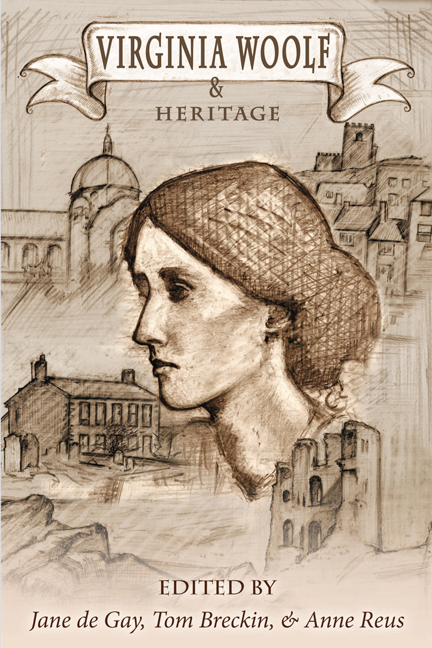Book contents
- Frontmatter
- Contents
- Introduction
- List of Abbreviations
- HERITAGE: A DEBATE
- HERITAGE, EDUCATION, AND MENTORING
- HERITAGE SPACES
- LITERARY AND CULTURAL HERITAGES
- QUEER PASTS
- Sex and Literary History in Orlando
- Queer Elizabeth: Early/Modern Feeling in Orlando and Elizabeth and Essex
- Persuading Rachel: Woolf and Austen's “little voyage of discovery”
- “The world…seen from this angle undoubtedly looks queer”: History, Heritage, and the Queer Domesticity of Between the Acts
- MODERNISM AND HERITAGE
- WRITING LIVES AND HISTORIES
- WOOLF'S LEGACIES
- FINALE
- Notes on Contributors
“The world…seen from this angle undoubtedly looks queer”: History, Heritage, and the Queer Domesticity of Between the Acts
from QUEER PASTS
- Frontmatter
- Contents
- Introduction
- List of Abbreviations
- HERITAGE: A DEBATE
- HERITAGE, EDUCATION, AND MENTORING
- HERITAGE SPACES
- LITERARY AND CULTURAL HERITAGES
- QUEER PASTS
- Sex and Literary History in Orlando
- Queer Elizabeth: Early/Modern Feeling in Orlando and Elizabeth and Essex
- Persuading Rachel: Woolf and Austen's “little voyage of discovery”
- “The world…seen from this angle undoubtedly looks queer”: History, Heritage, and the Queer Domesticity of Between the Acts
- MODERNISM AND HERITAGE
- WRITING LIVES AND HISTORIES
- WOOLF'S LEGACIES
- FINALE
- Notes on Contributors
Summary
Domesticity is not cool. “The domestic” often stands in for whatever needs escaping: heteronormativity, tradition, conservatism, parents, children, chores, routine. Domestic space isn't where the revolution happens. But perhaps this attitude is a continuation of the anti-“frock consciousness” that Woolf repeatedly deplores in her writing, a means of devaluing spaces, activities, and attitudes by associating them with women's work and women's lives. This perspective seems particularly prevalent in some corners of queer theory, which understands queer identity and politics in opposition to heteronormative and domestic ideals. Yet Woolf finds in the private house the source of a queer and queering vision on the masculinized public sphere. In Three Guineas, Woolf describes the queerness of the vantage point available to the daughters of educated men: the view of the world seen through the filter of domesticity, queer in that it renders strange the accepted order of the patriarchal world. Using this perspective on the revision of history and heritage that runs through Woolf 's last novel suggests that its queerness and its domesticity are not separate but linked, as inseparable as the public and the private.
While many queer readings of Between the Acts start with Miss La Trobe, she seems an unlikely character to lead into a domestic reading. She is, after all, the most unambiguously lesbian character to appear in Woolf 's novels; her queerness made legible partly through separation from domestic traditions. The narrator refers twice to La Trobe's living arrangements, first to imply, then to explicitly state her lesbianism: “She had bought a four-roomed cottage and shared it with an actress. They had quarreled” (BTA 40); “She would…go on up to the Inn. Since the row with the actress who had shared her bed and her purse the need of drink had grown on her” (143). La Trobe never enters the novel's central domestic location, Pointz Hall. She is aware of—and unconcerned by—the ways that others’ private living and dwelling don't always match up with public shows of domesticity, and how war encroaches on domestic totems like heterosexual monogamy: “Mrs. Ball's cottage was not what you might call clean. In the last war Mrs. Ball lived with another man while her husband was in the trenches. All this Miss La Trobe knew, but refused to be mixed up in it” (44).
- Type
- Chapter
- Information
- Virginia Woolf and Heritage , pp. 148 - 154Publisher: Liverpool University PressPrint publication year: 2017



